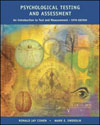 |
1 |  | 
How were Binet's ideas ahead of his time? What aspects of Binet's views are still evident in theory and practice today? What aspects of his ideas are no longer supported by modern-day psychologists? |
|  | |
 |
 |
2 |  | 
Compare and contrast the conceptions intelligence advanced by Binet, Wechsler, Piaget, Galton, Spearman/Guilford/Thurstone, Gardner, Cattell/Horn and Carroll (factor analytic theories of intelligence), Naglieri et. al., and Sternberg (information-processing view). |
|  | |
 |
 |
3 |  | 
Do you believe that intellectual ability is innate and that it simply 'unfolds' from birth onward? |
|  | |
 |
 |
4 |  | 
What do the terms performationism and predeterminism mean? What are the subtle differences in the meanings of the two terms? |
|  | |
 |
 |
5 |  | 
What behaviors of children and/or adults would support a predeterministic philosophy (e.g. walking, early stages of speech/language development)? |
|  | |
 |
 |
6 |  | 
How did Gesell’s work influence his predeterministic viewpoint? How might such a viewpoint influence an interpretation of infant intelligence test data? How might it affect recommendations for intervention if you should diagnose an infant who was significantly developmentally delayed or advanced? |
|  | |
 |
 |
7 |  | 
What is the interactionist viewpoint of the development of intelligence? How might this viewpoint affect your interpretation of infant intelligence tests and recommendations for intervention? |
|  | |
 |
 |
8 |  | 
What is the nature of the relationship between age and the stability of intelligence test scores? What factors account for this observed relationship? How might your knowledge of this relationship affect your interpretations of intelligence test scores and recommendations? |
|  | |
 |
 |
9 |  | 
Discuss the concept of the Flynn Effect. How does this factor impact measured intelligence? Discuss the implications of the Flynn effect for psychologists who use intelligence tests and for their clients. |
|  | |
 |
 |
10 |  | 
Discuss the arguments that could account for observed cognitive differences between males and females based on environmental (social and cultural factors) and predeterministic viewpoints. |
|  | |
 |
 |
11 |  | 
Why might Martin Kallikak's offspring by the "mentally defective waitress" be "far less socially desirable" than his "legitimate" children with his wife who had normal intelligence ? What explanation did Goddard offer? What alternative explanations might be advanced (educational opportunity, societal expectations, cultural differences, child-rearing, modeling, poor nutrition, personality factors, lack of environmental stimulation etc.)? |
|  | |
 |
 |
12 |  | 
Are slang terms such as those that appear on tests like the BITCH universally accepted across all African American cultures and across time? |
|  | |
 |
 |
13 |  | 
Discuss the impact of family environment on measured intelligence. Give examples of this impact from the your own experiences. |
|  | |
 |



 2002 McGraw-Hill Higher Education
2002 McGraw-Hill Higher Education